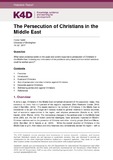| dc.description.abstract | A century ago, Christians in the Middle East comprised 20 percent of the population; today, they
constitute no more than 3-4 percent of the region’s population (Pew Research Center, 2015;
cited in Ben-Meir, 2016). The drastic decline in the number of Christians in the Middle East is
considered to be part of a longer-term exodus related to general violence in various countries,
lack of economic opportunities in the region, and religious persecution (Katulis et al., 2015;
Hanish, 2014; Weiner, 2014). The tremendous changes in the political order in the Middle East
since 2003, and the rise of violent extremist ideologies, have adversely impacted on Muslim-
Christian relations and on the protection of Christian and other minority groups (Kraft and Manar,
2016; Ben-Meir, 2016; Katulis et al., 2015). While the overall situation of Christians in the
Middle East is grim, their status and circumstances vary considerably across the region – with a
stronger sense of protection and security for Christians in Egypt and Lebanon, for example, than in Iraq and Syria (Katulis et al., 2015).
In 2016, various political bodies, including the U.S. House of Representatives and Senate and UK Parliament, declared that the atrocities of the militant group ISIS (Islamic State in Iraq and Syria)1, against Christians, Yazidis, Shi’a Muslims and other religious minorities in areas under its control amount to genocide (Shea, 2016; Kraft and Manar, 2016; Ochab, 2016; USCIRF, 2016). While ISIS has received much attention in recent years, it is not the only persecutor of Christians in the region.
This report explores various forms of persecution and discrimination that Christians experience in the Middle East. Much of the literature focuses on Egypt, Iraq and Syria, with some discussion of the situation in Iran and Saudi Arabia. This report reflects this country focus. There is very little discussion in the literature about current responses, apart from criticisms that responses have been absent and that Christian communities have not received adequate attention. Some argue, however, that Christian communities should not be singled out and that highlighting their plight over that of other persecuted minorities could exacerbate sectarian divisions in the region. | en |

